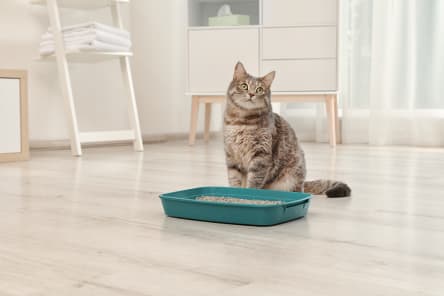Cat Urinary Tract Infection
While vets often see cats with urinary tract issues, our feline friends are more likely to suffer from urinary tract disease rather than an infection.
However, when urinary tract infections (UTIs) do develop in cats, an endocrine disease such as diabetes mellitus or hyperthyroidism is often the cause.
The majority of cats who suffer from UTIs are 10 years of age or older.
If your cat is showing symptoms of a urinary tract infection (see the signs listed below) and is diagnosed with an infection such as cystitis, your veterinarian will prescribe an antibacterial to help your cat fight the UTI.

Reduced amounts of urine, strainnig to urinate, not urinating at all, passing urine tinged with blood, pain or discomfort when urinating or urinating around the house, outside of the litter box are all common symptoms of urinary tract infection in cats.
A UTI may be the culprit if your cat is suffering from any of the symptoms listed above. However, these symptoms can also point to feline lower urinary tract disease (FLUTD).
Feline Urinary Tract Disease - FLUTD
This is actually an umbrella term that refers to a host of clinical symptoms. FLUTD can lead to serious issues in your cat's bladder and urethra, often causing the urethra to become blocked, or preventing your cat's bladder from emptying properly. These conditions can turn serious and even life-threatening if not detected and treated.
For cats suffering from FLUTD, urinating may be difficult, painful or impossible. They might also urinate more often, or in inappropriate areas outside their litterbox (perhaps on surfaces that are cool to the touch such as a bathtub or tile floor).
Causes of Feline Urinary Tract Disease
FLUTD can be a complex condition to diagnose and treat, since multiple contributing factors and causes can be in play. Your cat's bladder or urethra (the tube connecting the bladder to the outside of your cat's body) can be obstructed by stones, debris or crystals.
Other common causes of lower urinary tract issues in cats include:
- Environmental or emotional stressors
- Congenital abnormalities
- Spinal cord issues
- Incontinence as a result of excessive water consumption or weak bladder
- Urethral plug due to accumulation of debris from urine
- Inflammation or infection in the bladder, or urinary tract infection (UTI)
Cats who are middle-aged or overweight are at higher risk for urinary tract disease, as are those who eat a dry food diet, do not get enough physical activity or have little to no access to outdoors. That said, cats of any age can suffer from the condition. Male cats are also more susceptible to urinary diseases, since their urethras or more narrow and therefore more likely to become blocked.
Using an indoor litter box, emotional or environmental stress, multi-cat households or sudden changes to their everyday routine can also leave cats more vulnerable to urinary tract disease.
If your kitty is diagnosed with FLUTD it is essential to determine the underlying cause. FLUTD symptoms can be caused by serious underlying health issues such as bladder stones or infection to cancer or a blockage.
If your vet is unable to determine the cause of your cat's FLUTD, your kitty may be diagnosed with a urinary tract infection called cystitis which is inflammation of the bladder.
Symptoms of Feline Urinary Tract Disease in Cats
If your cat has FLUTD or a cat urinary tract infection you may notice one or more of the following symptoms:
- Inability to urinate
- Loss of bladder control
- Urinating small amounts
- Urinating more than usual or in inappropriate settings
- Avoidance or fear of litter box
- Strong ammonia odor in urine
- Hard or distended abdomen
- Cloudy or bloody urine
- Drinking more water than usual
- Excessive licking of genital area
- Lethargy
- Vomiting
It’s critical that any bladder or urinary issue be treated as early as possible. Delays in treatment could lead to your cat's urethra becoming partially or completely obstructed, which can prevent your feline friend from urinating.
The symptoms above indicate a serious medical issue that could quickly lead to kidney failure or rupture of the bladder. FLUTD can quickly be fatal if there is an obstruction that is not eliminated immediately.
Diagnosis of Feline Urinary Tract Disease
Urinary tract infections in cats require veterinary care, as do cats suffering from FLUTD. If your cat is showing any of the symptoms above it's time to visit the vet. If your cat is straining to urinate or crying out in pain contact your vet, or the nearest emergency veterinary clinic as soon as possible - your cat may be experiencing a veterinary emergency.
Your vet will perform a complete physical exam to help assess your cat's symptoms and perform a urinalysis to get further insight into your kitty's condition. Radiographs, blood work and a urine culture may also need to be done.
Cat Urinary Tract Infection Recovery
Urinary issues in cats can be complex and serious, so the first step should be to make an appointment with your veterinarian for immediate care. The underlying cause of your cat's urinary symptoms will dictate which treatment is prescribed, but may include:
- Increasing your kitty's water consumption
- Antibiotics or medication to relieve symptoms
- Modified diet
- Expelling of small stones through the urethra
- Urinary acidifiers
- Fluid therapy
- Urinary catheter or surgery for male cats to remove urethral blocks
Note: The advice provided in this post is intended for informational purposes and does not constitute medical advice regarding pets. For an accurate diagnosis of your pet's condition, please make an appointment with your vet.
